

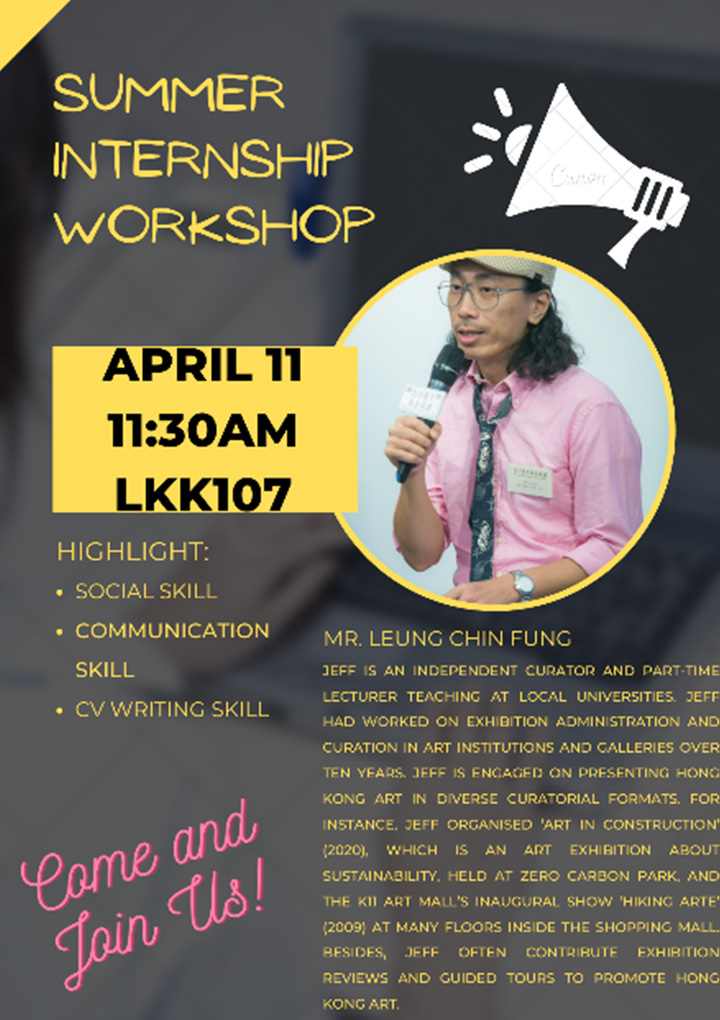
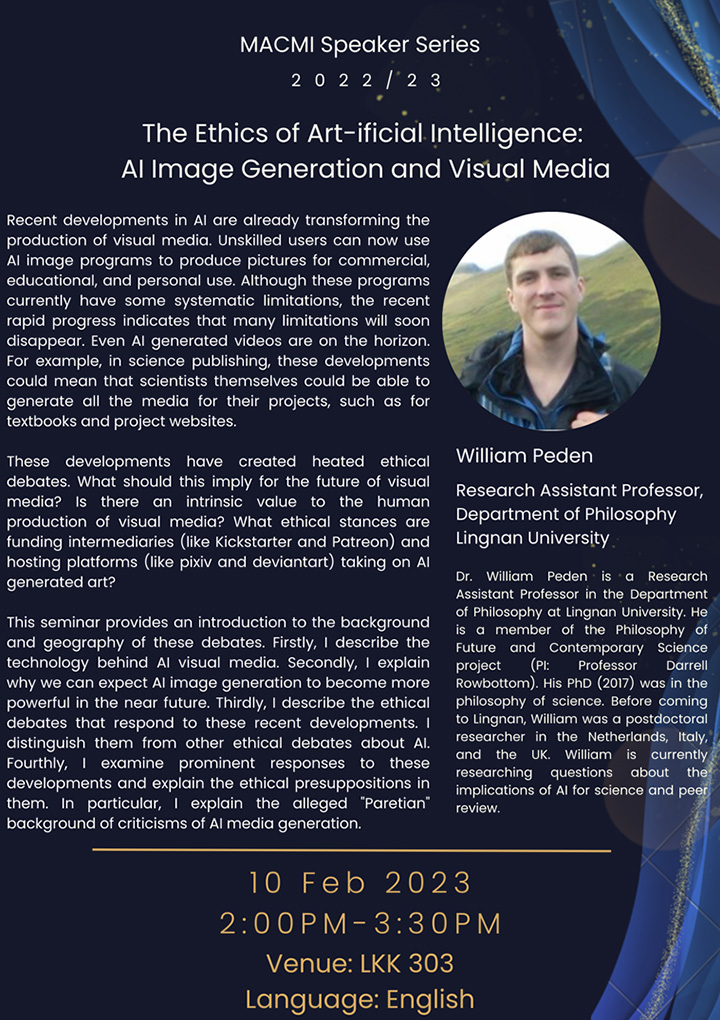
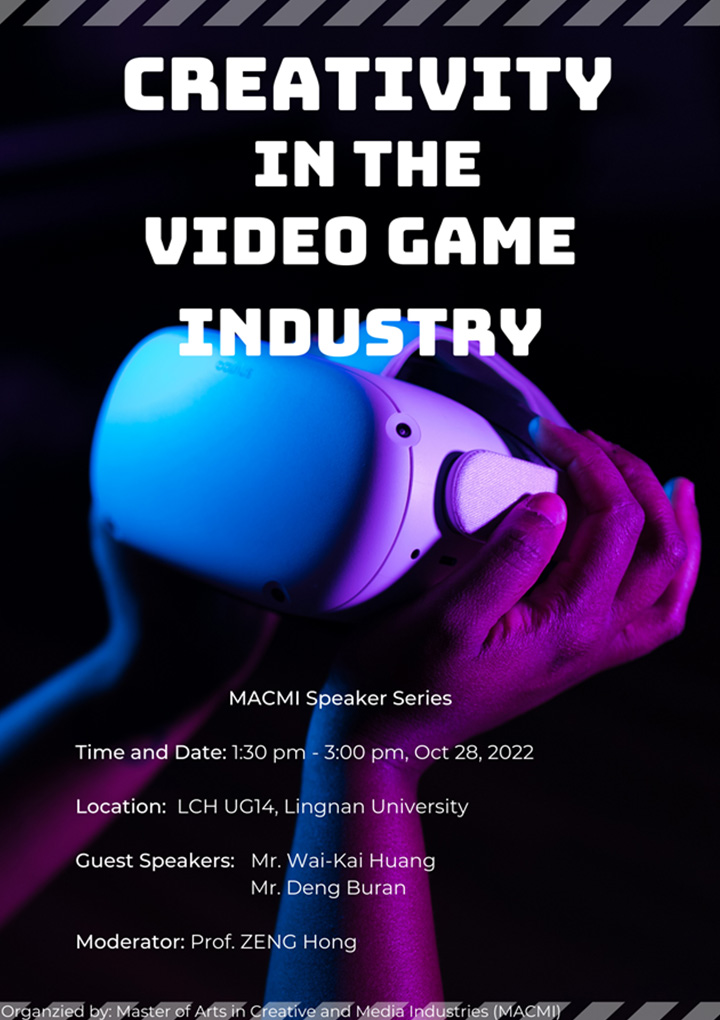
Hosted by the Department of Digital Arts and Creative Industries (DACI) and the Department of Philosophy with the support of the Centre for Film and Creative Industries (CFCI) of Lingnan University, the Master of Arts in Creative and Media Industries (MACMI) provides both basic and advanced courses on creative and media industries, i.e. connected fields in film, television, music, performing arts, architecture, visual arts, and interactive media, as well as archive, museum and amusement services – which collectively constitute the most dynamic sector of cultural economy in Hong Kong. The programme is structured on three grounds:
Graduates of the Programme will be capable of taking up jobs in creative and media industries sector, including government organisations, organisations in film, media and arts, arts and cultural trust foundations, media and publishing companies. They are expected to find employment in more than a dozen creative and media industries sectors locally and regionally, including a number of signature trade fairs and events (e.g. Filmart, Art Basel, Ani-Com and Games Hong Kong, Hong Kong International Film Festival (HKIFF), Hong Kong Book Fair, Macau International Film Festival, Pusan International Film Festival (PIFF), Tokyo International Film Festival (TIFF), performing arts venues (e.g. Xiqu Centre, Cultural Centre, City Hall, Guangzhou Opera House), archives (HKFA), NGOs, museums and art galleries in Hong Kong and the Greater Bay Area (e.g. M+, National Palace Museum, Shenzhen Art Museum).
To provide an interdisciplinary understanding for students to explore the dynamics and processes of creative and media industries;
To foster development of the emergent field of creative and media industries studies, new to Hong Kong and the region;
To respond to the needs of Hong Kong society and economy.
At the end of this programme students will be able to
Synthesise a variety of theories, narratives and practices of creative and media industries as a new knowledge economy and a new field of research and study;
Explain the concepts of creativity and its operations in creative and media industries locally, and in media capitals further afield;
Develop fluency in various methodologies and apply them in case studies;
Construct and evaluate selected case studies in Hong Kong and regional creative enterprises;
Become a practitioner in creative and media industries, such as programmers, event organisers, producers, managers, publicists and researchers, or a scholar by enrolling into more advanced programmes.
The MACMI programme is composed of 30 credits, including 5 required courses (15 credits) and 5 programme electives (15 credits) or 3 programme electives and a final project (6 credits).
This course will ground students in the conceptual foundations and historical claims made by the field of creative and media industries. And it will compare the features of a series of influential global/regional creative and media industries. Students will learn to skillfully reflect on the concepts and methods scholars have developed to analyse these industries and will build a research project addressing a creative industries topic of their own choosing.
The course aims to discover what media industries are, and how to approach them analytically. Matching research questions with businesses, practices, products and difficulties often found in film, television, and other media industries. Looking for revealing camouflage; learning how to approach media industries in the field, reverse engineering provisional theses from traits visible in media products.
This course will introduce students to some of the basic issues they can expect to face if they pursue a career in media industries, and will also delve deeper into select issues in order to encourage ethical reflection. The course will guide students to (1) discuss the basic legal and ethical issues facing the media in Hong Kong; (2) to reflect on current ethical questions relevant to a career in the media; (3) to discuss their views on ethical issues; and (4) to think creatively about solving ethical problems.
The course aims to install a deeper knowledge of Hong Kong as a robust creative and media industries hub in relation to cultural economy, creative talents and new business models. Students will explore key components and major milestones of the relevant sectors as they developed into a crucial part of Hong Kong’s cultural economy and signposts of the city’s cultural landscape.
This course aims to provide students with the opportunity to engage directly with prominent practitioners, artists, and professionals who work in the creative and media industries. Through this course, students will also have the chance to participate in major industrial fairs in Hong Kong, gaining valuable insight into the latest trends and developments in the industry. To achieve this, the course instructor invites experienced media producers and senior managers in media institutes as guest speakers to share their industry experiences and offer practical guidance for students’ career development. Following the guest lectures, students will participate in one‐hour tutorial sessions to discuss their takeaways and relate them to the theories they learn from the MACMI core courses. Additionally, field trips to events such as Art Basel and the Hong Kong International Film Festival will be arranged to enrich students’ first‐hand experiences of Hong Kong’s media and creative industries showcases.
This course will explore the relationship of art and technology through the study of art history from modern art to mixed-media art, net art, digital art, computer animation, CGI, interactive installation, robotic art, biotechnology and so forth. Different artists and their applications of different technologies will be studied to explore their relationship to transforming culture and society. Students will gain broader understanding and critical awareness of different concepts and developments of art and technology from early experiments by futurists and constructivists to most recent practices like interactive games and expanded reality experiments with wearable and portable media. The course will acquaint students with the creative ideas of art solutions related to technology and the overall impact of technology on the arts. It encourages students to analyze and criticize different forms and practices of electronic/media arts from conceptual design to practical applications.
The course aims to provide students with fundamental theories and analytical tools for investigating the role of architectural heritage in creative industries and its potential contribution to the quality of life and economy of the corresponding areas. It also aims to acquaint students with the visual/architectural skills for conducting on-site case studies and composing architectural proposal for creative reuse.
This course discusses some of the central issues that have been debated in contemporary mainstream aesthetics and philosophy of art. The topics covered in the course include: (a) the notion of aesthetic value and its connections with other values (for example, moral or artistic), (b) the nature and structure of aesthetic concepts and the way they are deployed in aesthetic understanding, (c) the mind-dependence (or mind-independence) of aesthetic properties such as beauty, ugliness, gaudiness, elegance and so on, (d) the definition of art, (e) specific philosophical issues related to contemporary forms of art, such as installations and digital art.
This course offers an introduction to the notions of imagination and creativity from the point of view of contemporary philosophy of mind. Among the questions investigated in this course: how is the imagination like and different from belief? How does imagination connect with action? How does imagination function in our engagement with fictions? In this course, we will also consider creativity as it relates to imagination: is imagination necessary or essential to creative thought? Finally, we consider some theories of creativity in the arts.
The course will introduce theories and histories of film conservation and digital humanities. It will show students how to utilise digital technology as a tool for visualisation of knowledge, and processing and analysing digital repositories. In addition, practical and ethical issues derived from digital conservation projects will be highlighted to help students in conducting their case studies.
The course aims to equip the students with the essential ideas about the key issues and agents involving Creative Industries (CIs) and cultural policy. In helping the students become familiar with the particular histories and practices of CIs and cultural policies in East Asia, the course aims to sharpen their critical thinking about the functioning and effectiveness of such practices in these countries. It aims at helping the students better understand the operations and forms of decision-making involving the media landscape across East Asia and beyond.
This is a course partly on visual attention – from the point of view of contemporary philosophy of mind – and partly on art. Some examples of questions to be addressed in the more mind-oriented component of the course: What is the content of visual experience? Can vision be top-down affected/penetrated by expectations/knowledge/ values? What is attention? Some examples of questions to be addressed in the more art-oriented component of the course: To what degree is taste/aesthetic judgment a perceptual (visual) phenomenon? What space is there for objectivity in aesthetic judgment? Do different perceivers (say an expert painter vs. a complete novice) *see* artworks differently?
This course empowers students to apply theories and methodologies learned across the MACMI curriculum to analyse – in depth – a creative and media industries topics of their own choosing. With the supervision of a faculty member with relevant expertise, students will engage in self-directed research and interrogate relevant scholarly perspectives on the object of their study. The capstone project will offer students a valuable opportunity to connect their MACMI scholarship with their future careers.
The course will offer students introduction to the philosophical, ethical, and technical notions required to understand the current debates surrounding AI and its impact in various areas of the creative and media industries. Influential theories and arguments will also be highlighted throughout the course.
Curating is a contested field of practice, mediating the production, circulation and consumption of art and culture, as well as offering a reflection on the social and cultural phenomenon. To enable students’ understanding of curatorial approaches, this course will introduce the histories of curating and curatorial discourses and practices in both Western and Asian contexts. It will focus on key themes and debates within exhibition-making such as the role of curator, boundary-pushing curatorial concepts, curating in and outside the museum and working with communities and other mediums and disciplines. Besides, it provides an experimental platform for students to interpret artworks and design.
This course explores the role of digital technologies in curatorial practice. It aims to provide competent knowledge of various forms of digital media employed by curators in exhibition design and museum management. Digital media provides specific potentials in interactive, participatory, physical or virtual presentations. The course will start with an overview of such development and application in a museum setting. With case studies to different digital tools, students will be familiar with their advantages and limitations, especially to their potentials in narrative, communicative and educational purposes. Students will be guided to identify the media specific properties and based on these, they will plan for an effective strategy to match curatorial objectives.
English is the medium of instruction for most courses including all core courses. Some electives may be offered in Cantonese or Putonghua.
1-year Full-time
2-year Part-time
To qualify for the award of the Master of Arts in Creative and Media Industries offered by Lingnan University (LU), students must, where applicable:
obtain 30 credits;
attain a cumulative G.P.A. of 2.67 (equivalent to B-) or above; and
fulfil the University exit requirement on English language competency, if applicable; and fulfil all University/programme requirements.
For admission to the programme, an applicant shall
hold a relevant bachelor’s degree awarded by a tertiary education institution recognised for this purpose by the University; or
have obtained an equivalent qualification; or
have provided satisfactory evidence of academic and professional attainment.
In addition to the above, an applicant whose degree or, exceptionally, an alternative qualification deemed equivalent is not from a tertiary institution in Hong Kong or an English-speaking country or with English being the medium of instruction (MOI) for the degree programme should obtain a minimum score of 550 (paper-based test) or 79 (internet-based test) in the Test of English as a Foreign Language (TOEFL), or a band score of 6.5 or above in the International English Language Testing System (IELTS), or an equivalent score in a recognised test, or an equivalent qualification to prove his/her language proficiency which will be considered on a case-by-case basis.1
1For IELTS and TOEFL qualifications for admission to Term 2, 2018-19 intake and onwards, the University only accepts results that are within the validity period, viz. 2 years, from the time of submission of an admission application for the specific intake cohort.
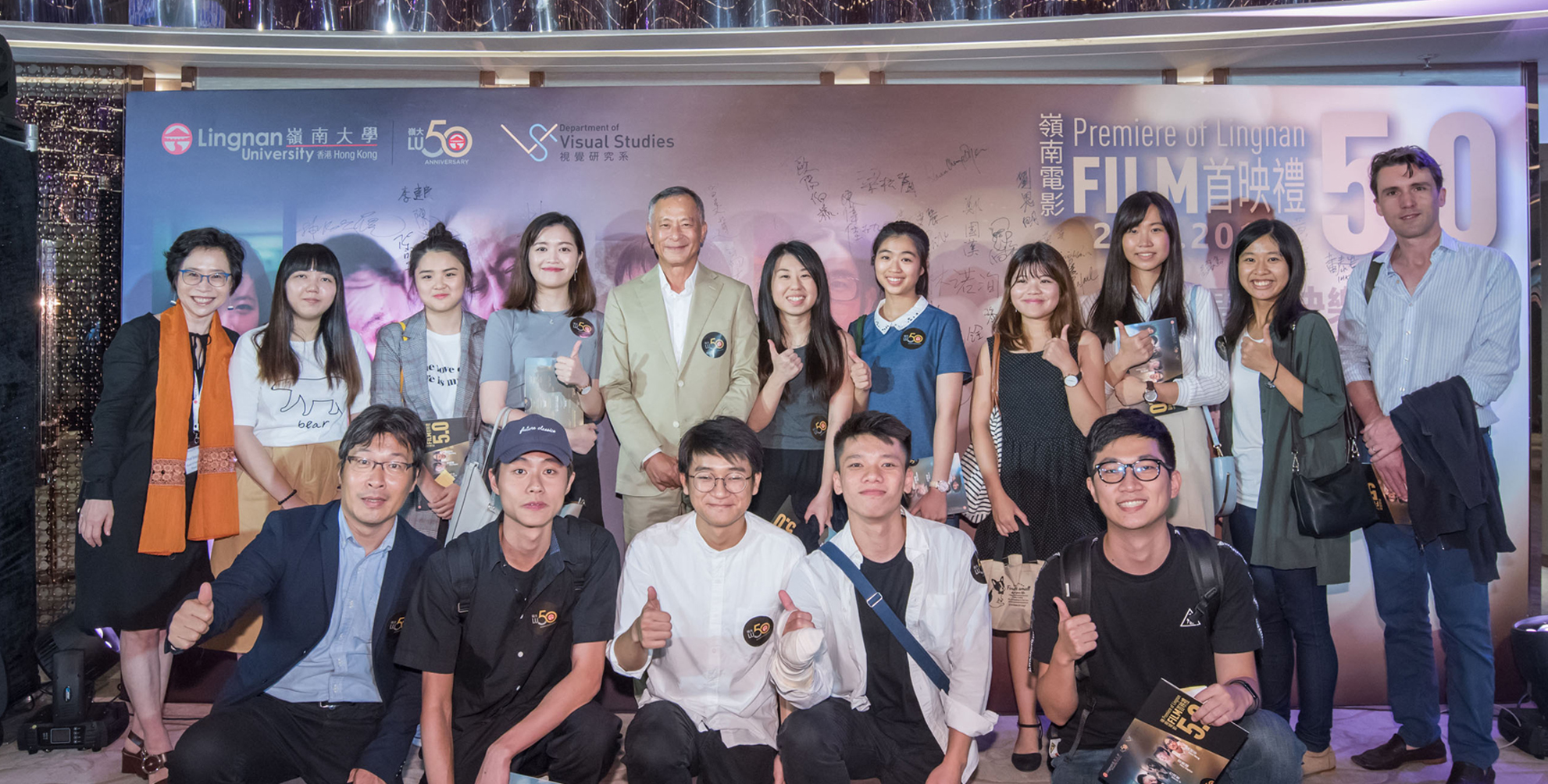
While the idea of forging a career in the world of art, music, film, television, or architecture used to be considered a risky bet, these fields can now also be seen as ones in which digital technology will always struggle to displace human creativity.
Lingnan’s new MA in Creative and Media Industries aims to recentre the human within creativity, explains Professor Wesley Jacks of the Department of Visual Studies.
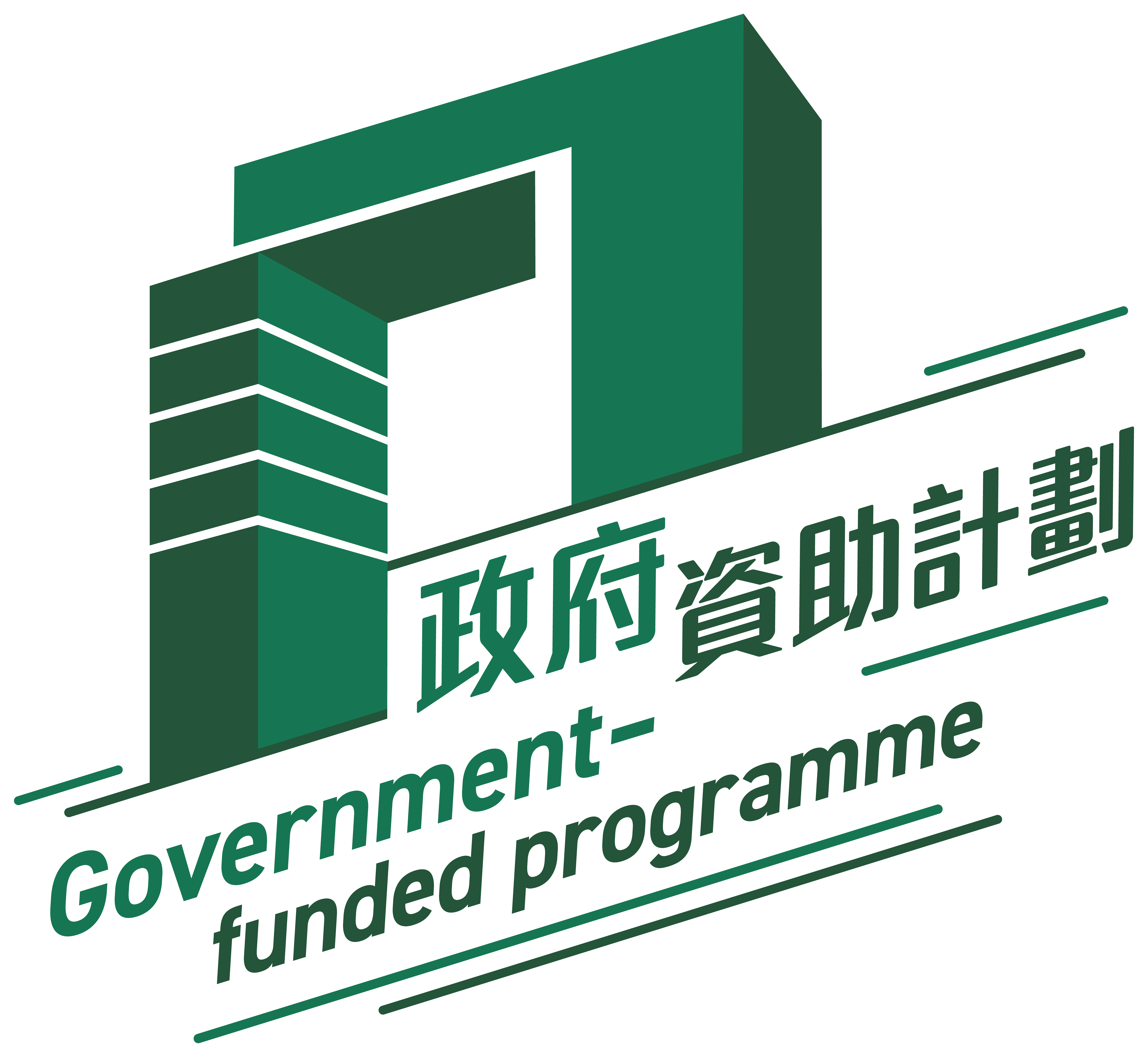
1-year Full-time: For 2024-2025 intake, the annual tuition fee for full-time study is HK$150,000.
2-year Part-time: For 2024-2025 intake, the annual tuition fee for part-time study is HK$75,000.
Two kinds of scholarship—the Entrance Scholarship and the Graduate Scholarship will be offered to the students from the MACMI Programme at the time of entrance or at the time of graduation.
The Entrance Scholarship will award 4 admittees with a good bachelor degree and an excellent academic record with IELTS 7.0 or above, or its equivalents. Each awardee will receive HKD 10,000 cash award.
The Graduate Scholarship will award 2 students who have distinguished themselves in their course of study with a final CGPA minimum of 3.5. Each awardee will receive HKD 10,000 cash award.
Eligible local applicants shall be invited to apply for the Scheme. Each recipient will receive a scholarship up to HK$107,900.
Note: All documents submitted will not be returned. Information on all unsuccessful applicants and applicants who have declined the offer will be destroyed after the admission exercise. All application fees paid are non-refundable and no receipt for application fee will be issued.
1 November 2023 to 31 May 2024

History of modern architecture in East and Southeast Asia, the material culture and history of Shanghai plaster, conservation of historical built heritages
Q: When will the interview result be released?
A: We shall inform the result within two weeks by email.
Q: When and how should I pay the deposit and tuition fee?
A: The official admission letter contains payment methods and the payment deadline. For locals, we suggest to use cheques for the payment. For non-locals, we accept both Money Order / Bank Draft as well as TT (Telegraphic Transfer).
Q: If I have not met the minimum English requirement, what should I do?
A: If you are interviewed and given a conditional offer, we advise you to take IELTS /TOEFLs to meet the minimum English requirement, to meet the condition. If you fail to meet the minimum English requirement by a deadline, the condition offer will be forfeited.
Q: Does MACMI offer Scholarship?
A: All students admitted to MACMI will automatically be qualified for competing with the scholarship, which will be offered to students with outstanding academic achievements.
To take charge of the programme including programme design, and the implementation and review of the curriculum;
To review and carry out the admissions policy for the MACMI Programme
To liaise with the Registry/School of Graduate Studies on all academic matters, including review of academic regulations and confirmation of course assessment results
To ensure the intended student learning outcomes will be achieved
To report to the Board of the Department of Digital Arts and Creative Industries and the Board of the Department of Philosophy on the progress, review, and development of the MACMI Programme
To handle all other matters related to the MACMI Programme
Chairperson: Programme Director
Members:
Two full-time academic staffs of the Department of Digital Arts and Creative Industries
Two full-time academic staffs of the Department of Philosophy
Two student representatives
Secretary:
To be appointed by the Chairperson
To maintain the academic standards of the programme;
To maintain general supervision of the system of continuous assessment;
To assess the performance of students in the programme;
To maintain the proper conduct of examinations;
To approve the final examination results;
To make recommendations of students for graduation/special consideration for continuation/discontinuation;
To deal with grievances and appeals from students; and
To report to the Postgraduate Studies Committee of the Senate.
Chairperson: Programme Director or his/her delegated representative
Members:
Deans of Arts
Head of the Department of Digital Arts and Creative Industries
Head of the Department of Philosophy
All staff involved with the setting and marking of any part of the examinations
Secretary:
To be appointed by the Chairperson
The level and length of the programme and its courses in relation to local needs;
The relevance of the programme and its courses in relation to local needs;
The adequacy of the equipment and other resources of the Department for the fulfilment of local needs;
The development of teaching and other activities carried out jointly by the Department and the appropriate sector of the community;
Investigation consultancy and other services given by the Department;
The assistance which the community can give to further the objectives of the University in the subject concerned by way of practical training facilities, the provision of part-time teaching staff and equipment, the award of scholarships, student-fellowships, etc.
Chairperson: to be nominated by the Convener (see below) and appointed by the Senate
Convener:
Programme Director
Members:
3-8 members, to be nominated by the Convener and appointed by the Senate
The Dean of Arts (ex officio)
Secretary:
to be appointed by the Convener
Observers/advisers:
The Chairperson may invite any persons to attend meetings as observers or advisers
To promote understanding between students and teaching staff
To consider feedback from students regarding teaching, learning, course evaluation, and issues of importance for enhancing teaching and learning quality
To review and monitor the learning and teaching quality assurance mechanisms and processes within the MACMI Programme.
To formulate strategies in helping students to learn more effectively
To consider any other matters of concern to students
Chairperson: Programme Director
Members:
Two teaching members of the MACMI Programme
Two student representatives
Secretary:
to be appointed by the Chairperson
Department of Cultural and Religious Studies
The Chinese University of Hong Kong
Faculty of Creative Industries, Education and Social Justice
Queensland University of Technology
National Central University
Department of Film and Media Studies
University of California, Santa Barbara
Academy of Film
Hong Kong Baptist University
Taiwan Film and Audiovisual Institute
Department of Digital Arts and Creative Industries
Lingnan University